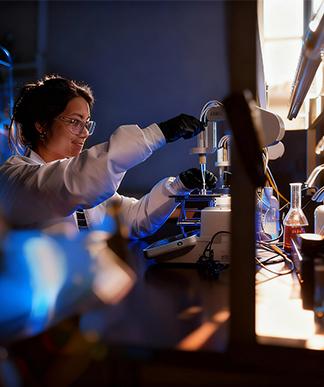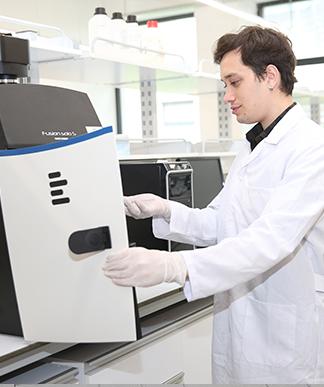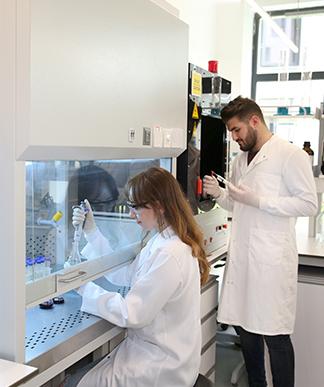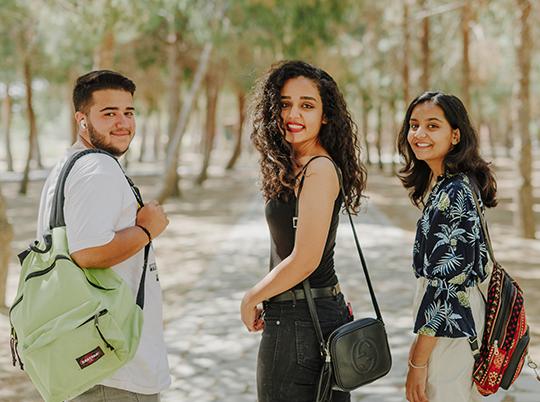


About the Department
Department of Molecular Biology and Genetics, which was established in 2017, is an interdisciplinary field that is constantly developing. It investigates the interactions of the basic properties, structures and functions of molecules that make up life, their role in development, physiological and pathological phenomena. The Department of Molecular Biology and Genetics (English) teaches the fields of Bioengineering, Chemical Biology Engineering, Systems Engineering, Software Engineering and Computer Engineering, with the vision of combining theory and practice. The department aims to train the most suitable candidates in academic positions and other job opportunities with its multidisciplinary education system. Molecular Biology coincides with the genetic science of inheritance and diversity between organisms. Molecular Biology and Genetics, therefore, tries to explain the issues that form the basis of life by approaching biological processes in terms of molecular structure and functions at the level of structure and function of biological molecules. Research in different disciplines such as cancer, genetic and metabolic diseases, microbial genetics and biotechnology, plant biotechnology are conducted with the support of international institutions. Department of MBG, which provides a modern infrastructure for the researchers in our laboratory on related topics, plans to develop interdisciplinary studies with the Departments of Physics and Chemistry parallel to the evolution of molecular biology and technology. In order to educate scientists in accordance with this change, the Department of MBG started to prepare double-major or triple-major undergraduate programs especially in Physics and Chemistry.
MISSION and VISION
MBGE Mission: The mission of the MBGE Program is to provide global, multidisciplinary education and training in basic, applied and computational sciences through a wide range of theoretical and laboratory courses, which include a special focus on genetics, cellular and molecular biology. We strive to equip our students with the knowledge and technical capabilities that will allow them to develop their careers in various fields such as in academia, biological sciences and research, clinical diagnostics, scientific communication, healthcare and medicine.
MBGE Vision: We aspire to be the leading undergraduate program in Molecular Biology and Genetics in Cyprus by bringing together a diverse group of students to be independent, skilled, and ethical researchers, who strive to be global leaders in scientific research and discovery and who work for the betterment of societies and of human life.
Education Opportunities
In the department, there is qualified academic staff providing English-medium instruction. The current monitoring of global academic development and transformations based on the universality of scientific language is much emphasized. The high-level laboratory facilities of Cyprus International University have given the education processes in this department a contemporary and high-level identity. In addition to the academics and laboratory facilities in the fields of Physics and Chemistry, the presence of the Faculties of Medicine and Dentistry also carries the education processes of this department to higher levels. In the program, there are courses on biology, bioinformatics, genetics, genomics, population genetics, cell biology, biochemistry and stem cell research that will direct students to different fields. In addition to the comprehensive general courses in the core program of Cyprus International University, students in this department take general biology, biochemistry, organic chemistry, molecular biology, cell biology, genetics, developmental biology, biotechnology, bioinformatics and laboratory courses. Students are expected to participate in research under the supervision of a faculty member and to increase their knowledge and skills through research projects in their final year.

Career Areas
Graduates will be the backbone of many companies in the developing biotechnology sector. Stem cell, genetic diagnosis and vitro fertilization centers and forensic medicine institutions are among the business fields in which our graduates would succeed in. A significant number of our graduates will be able to continue their academic studies in many distinguished universities and research institutions whom we have cooperation agreements with. Molecular biologists can be academics in universities’ science, medicine, agriculture, pharmacy and veterinary faculties. In addition, graduates can work in the state sector at ministries, research institutes and within the body of state economic enterprises. In the private sector, they can be involved in research and development and quality control units in the pharmaceutical and food industries. In the medical sector, they can be selected to work at hospitals, special analysis laboratories, criminal laboratories, R&D and quality control laboratories of private organizations and in vitro fertilization units. They can work as sales representatives and technical consultants in import and export divisions of private companies in the field of Medicine and Biology. They will also benefit from a wider business opportunity with the development of new sectors such as stem cells in future.
Contact
Faculty of Arts and Sciences
Education and Humanities Center, EH113
Tel: +90 392 671 1111 Extension: 2601
Faculty E-mail: secretary-fas@ciu.edu.tr
Head of Department: Asst. Prof. Dr. Vural YILMAZ
Head of Department E-mail: vyilmaz@ciu.edu.tr
Compulsory Courses
First Semester
GENERAL BIOLOGY
Course code
BIOL101Credit
4Theoretical
3Practical
2Ects
7GENERAL CHEMISTRY
Course code
CHEM110Credit
4Theoretical
3Practical
2Ects
6INTRODUCTION TO COMPUTING
Course code
CMPE101Credit
3Theoretical
2Practical
2Ects
5READING AND WRITING SKILLS-I
Course code
ENGL141Credit
3Theoretical
2Practical
2Ects
4CALCULUS-I
Course code
MATH101Credit
3Theoretical
3Practical
1Ects
6TURKISH LANGUAGE
Course code
TREG100Credit
0Theoretical
2Practical
0Ects
2TURKISH
Course code
TURK100Credit
0Theoretical
2Practical
0Ects
2Second Semester
ORGANIC CHEMISTRY
Course code
CHEM104Credit
3Theoretical
3Practical
0Ects
6READING AND WRITING SKILLS-II
Course code
ENGL142Credit
3Theoretical
2Practical
2Ects
4CALCULUS-II
Course code
MATH102Credit
3Theoretical
3Practical
1Ects
6INTRODUCTION TO MOLECULAR BIOLOGY AND GENETICS
Course code
MBGE102Credit
4Theoretical
3Practical
2Ects
8GENERAL PHYSICS-I
Course code
PHYS101Credit
4Theoretical
4Practical
0Ects
6Third Semester
BIOCHEMISTRY
Course code
CHEM215Credit
4Theoretical
3Practical
2Ects
6FREE ELECTIVE
Course code
FREEXX1Credit
3Theoretical
3Practical
0Ects
6HISTORY OF CIVILIZATION
Course code
HIST100Credit
0Theoretical
2Practical
0Ects
2CELL BIOLOGY
Course code
MBGE201Credit
4Theoretical
3Practical
2Ects
8GENERAL PHYSICS-II
Course code
PHYS102Credit
4Theoretical
3Practical
2Ects
6MODERN TURKISH HISTORY
Course code
TARH100Credit
0Theoretical
2Practical
0Ects
2Fourth Semester
FREE ELECTIVE
Course code
FREEXX2Credit
3Theoretical
3Practical
0Ects
6GENETICS
Course code
MBGE202Credit
4Theoretical
4Practical
2Ects
8ECOLOGY AND EVOLUTIONARY BIOLOGY
Course code
MBGE204Credit
3Theoretical
3Practical
0Ects
5MICROBIOLOGY
Course code
MICB120Credit
4Theoretical
3Practical
2Ects
6BIOSTATISTICS
Course code
STAT110Credit
2Theoretical
2Practical
0Ects
3UNIVERSITY ELECTIVE
Course code
UNIEXX1Credit
3Theoretical
3Practical
0Ects
4Fifth Semester
FREE ELECTIVE
Course code
FREEXX3Credit
3Theoretical
3Practical
0Ects
5HUMAN GENETICS
Course code
MBGE301Credit
4Theoretical
3Practical
2Ects
7MOLECULAR GENETICS
Course code
MBGE303Credit
4Theoretical
4Practical
0Ects
8BIOINFORMATICS
Course code
MBGE305Credit
3Theoretical
2Practical
2Ects
5PHYSIOLOGY I
Course code
MBGE307Credit
3Theoretical
2Practical
2Ects
6Sixth Semester
MOLECULAR BIOLOGY I
Course code
MBGE302Credit
4Theoretical
4Practical
0Ects
7MOLECULAR BIOLOGY LAB I
Course code
MBGE304Credit
3Theoretical
1Practical
4Ects
6PHYSIOLOGY II
Course code
MBGE308Credit
3Theoretical
2Practical
2Ects
6AREA ELECTIVE
Course code
MBGEXX1Credit
3Theoretical
3Practical
0Ects
6IMMUNOLOGY
Course code
PHAR208Credit
2Theoretical
2Practical
0Ects
4Seventh Semester
GENETIC ENGINEERING
Course code
BIOE403Credit
4Theoretical
4Practical
0Ects
6MOLECULAR BIOLOGY II
Course code
MBGE401Credit
4Theoretical
4Practical
0Ects
7MOLECULAR BIOLOGY LAB II
Course code
MBGE403Credit
3Theoretical
1Practical
4Ects
6SEMINAR
Course code
MBGE405Credit
0Theoretical
0Practical
0Ects
2AREA ELECTIVE
Course code
MBGEXX2Credit
3Theoretical
3Practical
0Ects
6UNIVERSITY ELECTIVE
Course code
UNIEXX2Credit
3Theoretical
3Practical
0Ects
4Eighth Semester
SPECIAL PROJECT
Course code
MBGE402Credit
3Theoretical
1Practical
5Ects
6AREA ELECTIVE
Course code
MBGEXX3Credit
3Theoretical
3Practical
0Ects
6AREA ELECTIVE
Course code
MBGEXX4Credit
3Theoretical
3Practical
0Ects
6AREA ELECTIVE
Course code
MBGEXX5Credit
3Theoretical
3Practical
0Ects
6UNIVERSITY ELECTIVE
Course code
UNIEXX3Credit
3Theoretical
3Practical
0Ects
5Elective Courses
INTRODUCTION TO CANCER BIOLOGY
Course code
MBGE235Credit
3Theoretical
3Practical
0Ects
7STEM CELL BIOLOGY
Course code
MBGE473Credit
3Theoretical
3Practical
0Ects
7REPRODUCTIVE GENETICS AND TECHNOLOGIES
Course code
MBGE299Credit
3Theoretical
3Practical
0Ects
7MOLECULAR BIOLOGY AND MICROBIAL FOOD SAFETY
Course code
MBGE321Credit
3Theoretical
3Practical
0Ects
MOLECULAR BIOLOGY OF CANCER
Course code
MBGE421Credit
3Theoretical
3Practical
0Ects
7SOCIOLOGY
Course code
SOCY101Credit
3Theoretical
2Practical
0Ects
6MOLECULAR MICROBIOLOGY
Course code
MBGE477Credit
3Theoretical
3Practical
0Ects
7GENETICS AND PERSONALIZED MEDICINE
Course code
MBGE225Credit
3Theoretical
3Practical
0Ects
7BIOLOGY-I
Course code
BIOL103Credit
3Theoretical
3Practical
0Ects
4HISTORY OF MODERN CYPRUS
Course code
HIST220Credit
3Theoretical
3Practical
0Ects
4INTRODUCTION TO PHILOSOPHY
Course code
PHIL102Credit
3Theoretical
3Practical
0Ects
4HISTORY OF SCIENCE
Course code
PHIL230Credit
3Theoretical
3Practical
0Ects
5INTRODUCTION TO HUMAN SEXUALITY
Course code
PSYC325Credit
3Theoretical
3Practical
0Ects
6SOCIAL ANTHROPOLOGY
Course code
SOCY106Credit
3Theoretical
3Practical
0Ects
6TR Applicants
TR Students who are successful in the exams conducted by the Higher Education Council Student Selection and Placement Center (ÖSYM) and are entitled to enroll in our university in line with their preferences can complete the registration process with the necessary documents for registration from our Registration and Liaison Offices throughout Turkey or from the Marketing Directorate on campus.
Click for detailed admission requirements information.
TRNC Applicants
TRNC citizens and TR citizen candidate students who have completed their entire high school education in TRNC. They are placed in undergraduate programs in line with their success in the CIU Student Placement and Scholarship Ranking Exam and the programs they prefer.
Students who are successful in the exam can register from the TRNC Marketing Office.
Applicants can directly apply online to our undergraduate programs by using the application portal. Please fill in your details correctly and upload all the required documents listed on the last page of the application form.
Required documents;
- Completed application form,
- Higher/Secondary Certificate or equivalents (e.g. O/A’Level, WAEC/NECO)
- Evidence of English Language competence: TOEFL (65 IBT) or IELTS (5.5). Students without these documents will take the CIU English proficiency exam on campus following arrival,
- Scanned copy of international passport/birth certificate,
- Fully completed and signed CIU Rules and Regulations document (which can be downloaded during the online application).
Cyprus International University provides academic scholarships for its students as an incentive for success, with most students benefiting from 50%, 75% or 100% scholarships or discounted tuition fees. Click for more information.
Tuition Fees are determined at the beginning of each academic year. Candidate students who are entitled to enroll in CIU can learn their fees in line with the Tuition Fee Calculation system.